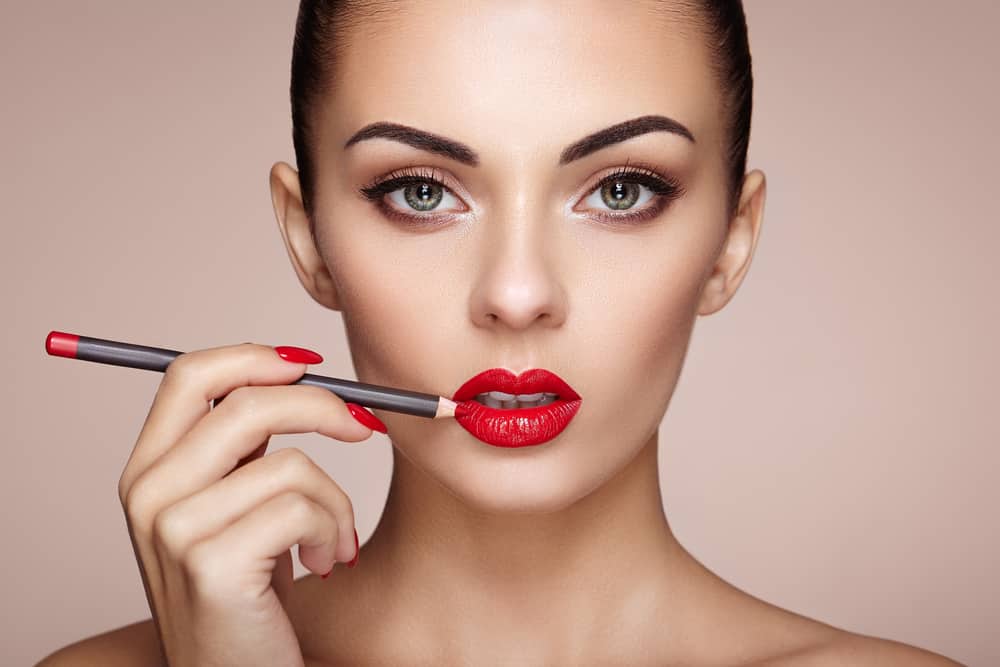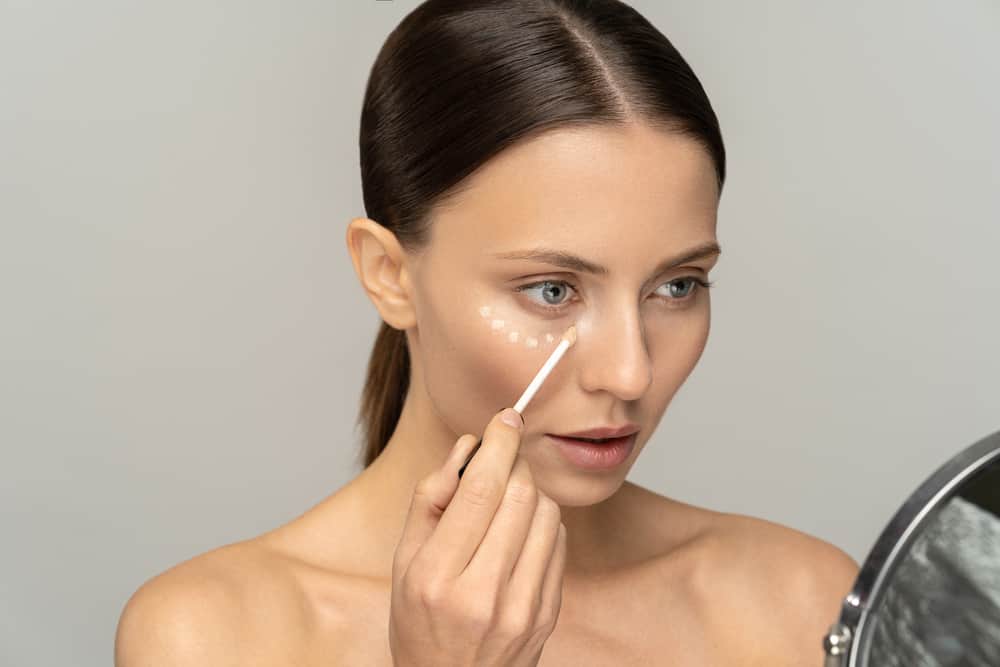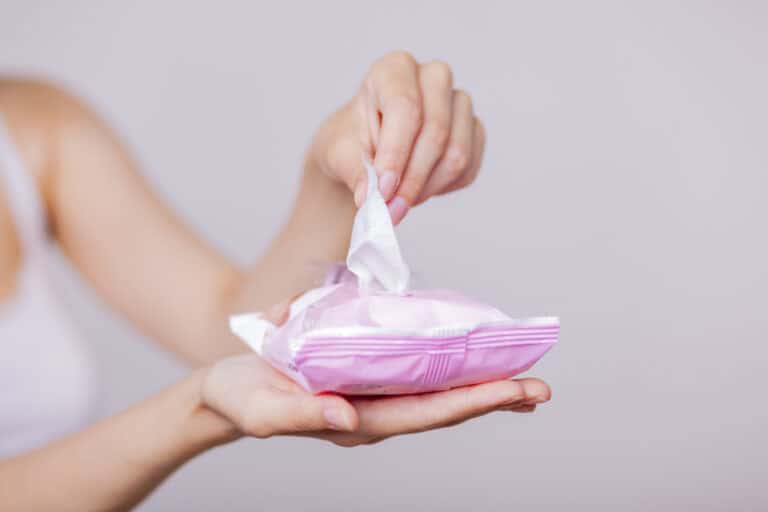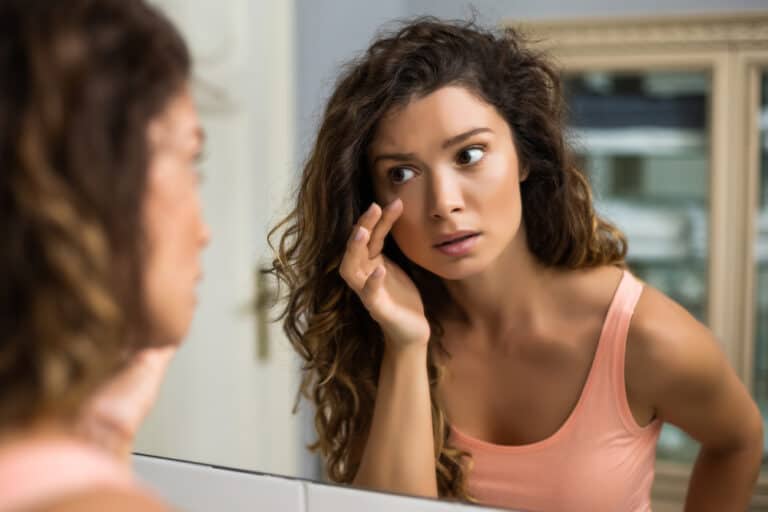Does Wearing Makeup Age You? (Explained)

There’s been a number of theories and urban myths on aging and the effects that makeup has throughout the years.
With all of the false data online, it’s often hard to break down the information thrown at us and get to the bottom of these rumors.
Since the dawn of time, both women and men have been trying to find that special anti-aging elixir—the magic eternal youth potion.
When makeup is worn to make us look younger, it can be unsettling to learn that it might be causing long-term aging effects.
Many foundations are sold with the sole purpose of defying wrinkles and with anti-aging promises, so how do we know what to trust?
Does Wearing Makeup Age You?

No, makeup alone does not age you.
In fact, dermatologists have already proven that makeup does not age your skin.
However, not all makeup is created equal, and there are some ingredients in certain products that can be harmful to your skin and cause lasting damage.
A poor skincare routine surrounding your makeup application and removal, however, can be harmful, so it’s important to keep this in mind when wearing makeup.
Also, if you’re using an incorrect product for your skin type, your skin might get irritated.
What Kinds of Things Do Age Your Skin?

Though makeup doesn’t age you, there are a number of other variables that can age or even cause long-lasting damage to your skin.
Things to avoid that cause skin to mature faster include excessive sunlight exposure, a poor diet, lack of sleep, alcohol consumption, air impurities such as those in air pollution, and, of course, smoking and street drug use.
Along with these external elements, a poor skincare routine can cause skin aging and skin damage.
Failing to cleanse your skin before makeup application can compound skin impurities, causing acne, breakouts, and even premature aging and wrinkles.
The same goes for removing makeup after wearing it.
It’s always recommended to clean off makeup with special makeup remover creams or wipes and cleanse your skin again after use.
Never go to sleep with your makeup on!
Washing your face after a day of makeup wear will help clear your skin of dirt, excessive oils, and other harmful debris.
This includes all forms of makeup, such as foundations, mascara, lipstick, blush, and anything else on your face.
Most makeup is not meant to be worn for 24 hours, so giving your skin a chance to breathe and refresh in between use is highly recommended.
How To Avoid Premature Skin Aging

Besides choosing the right makeup for your skin type, there are a lot of ways to keep from prematurely aging your skin.
The first step is to always apply sunscreen as a base cream on your face and other exposed body parts.
This doesn’t just keep you safe from skin cancers but helps keep your skin looking young and healthy.
Many foundations have built-in sunscreen, which allows you to skip this step.
However, foundations typically have around 25 SPF or lower, so it never hurts to apply a stronger SPF base before foundation application.
Even with adequate sunscreen, it’s always best to avoid sun exposure as much as possible.
Another great way to get youthful, glowing skin is to maintain a healthy diet full of fruits, vegetables, and fatty acids.
These foods include things like fatty fish (which contain Omega-3 and vitamin E—two excellent things for healthy skin), walnuts, sunflower seeds, avocados, bell peppers, sweet potatoes, tomatoes, and soy.
These foods contain essential vitamins, nutrients, and antioxidants for healthy skin maintenance.
Anything with carotenoid antioxidants, like beta carotene, acts like a natural sunscreen, keeping your skin safe from harmful sun rays.
Also, any food with vitamin C helps your body produce collagen, which helps keep your skin firm and flexible.
Hydration is another major factor in healthy, young-looking skin.
Look for moisturizers with alpha and beta hydroxy acids, niacinamide, hyaluronic acid, retinol, and ceramides for optimum hydration and to help reduce the appearance of fine lines and wrinkles.
Also, don’t forget to drink lots of water!
Which Makeups Are Best for Aging Skin?

Nowadays, makeup manufacturers are working to include many more healthy ingredients in their products, including vitamin C, collagen, niacinamide, hyaluronic acid, retinol, and more.
This is extremely helpful as it lessens the need to take skin health supplements and may help your skin if you have a poor diet.
However, it’s essential to first identify your skin type (oily, normal, or dry) before investing in a lot of makeup.
Your skin type will narrow down your options, as there’s not one universal makeup for everyone.
For instance, you don’t want to purchase a foundation high in oil content if you already have oily skin.
This will contribute to more breakouts and skin imperfections.
Once you identify your skin type, research what foundations will work best for you.
Many lists online are broken up by skin type, making it easy to find the best option.
You don’t need to spend an arm and a leg to find quality makeup that works for you.
Just look for foundations with anti-aging and hydrating ingredients like hyaluronic acid, retinol, and vitamin C.
It may take some trial and error to find the perfect fit, but luckily, many makeup manufacturers have hopped on the anti-aging bandwagon, providing consumers with multiple options.
What Makeup Ingredients Should You Avoid?

Now that you know which ingredients to look for, it’s also helpful to learn which ingredients to avoid.
Many makeup manufacturers try to distract consumers with eco-friendly packaging or cruelty-free labels, and though those are admirable traits to have, they still don’t mean that the makeup itself is safe for you.
Some of the most harmful ingredients to avoid in your makeup are phthalates, parabens, diethanolamine (DEA) and triethanolamine (TEA), synthetic fragrances, octinoxate and oxybenzone, formaldehyde, butylated hydroxyanisole (BHA) and butylated hydroxytoluene (BHT), PEG-10 laurate, hydroquinone, benzalkonium chloride, petrolatum, siloxanes, sodium Laureth sulfate, and coal-tar dyes.
Additionally, it’s best to avoid makeup products that contain alcohol, talcum powder, and microbeads.
Some alcohols like isopropyl, ethanol or ethyl alcohol, methanol, denatured, SD, and benzyl are drying to your skin, especially if you already have skin sensitivities.
Some talcum powders are considered carcinogenic and can cause respiratory problems, while microbeads are made of plastic which can clog your pores and cause severe environmental damage once they’re washed down the drain.
We know the list is long, but it’s worth checking your makeup products for these ingredients to ensure you’re not unknowingly damaging your skin.
Makeup products using naturally derived ingredients may be a bit more expensive, but they are worth the extra cost as they’ll keep your skin looking young and healthy.
What Else Should You Do To Keep Your Skin Healthy?

Besides adopting a daily skincare routine and eating right, it’s also important to clean your makeup brushes regularly.
This is one step most makeup-wearers forget about or fail to do enough.
Many people think they can just shake off their makeup powder or tap it against the sink in order to clean the brush.
However, a more thorough makeup brush cleaning is most effective at keeping your skin looking great.
When you mix products and their oils and ingredients start to build up on your brush or sponge over time, you’re effectively just transferring dirt, oil, bacteria, and pollutants back onto your face—something you should try to avoid.
It’s recommended that you wash your makeup brushes, sponges, or applicators at least once a week.
Brush cleansers are the perfect solution because they thoroughly clean your brush of oil, dirt, and debris, with the help of some water.
However, if you do not want to purchase brush cleansers, then a drop of gentle soap or shampoo and water will do the trick.
Just remember to thoroughly rinse your applicator after washing to avoid any kind of soap residue which can be harmful to your brush and also irritate your skin.
What To Do if Your Makeup Is Irritating or Causing Skin Damage?

If the current makeup you’re using doesn’t contain the helpful and nourishing ingredients mentioned and instead contains one or more of the established harmful ingredients, it’s highly recommended that you switch products.
Give your new healthier and nutrient-packed makeup a chance to hydrate and make your skin healthier.
If you already use makeup with good ingredients and none of the bad and your skin is still dry or irritated, chances are you’re still using the wrong product for your skin type, using a cleanser or moisturizer that doesn’t suit your skin type, or failing to use a cleanser or moisturizer at all.
For example, if your skin is oily and you avoid using a moisturizer (assuming the moisturizer will only make your skin greasier), you’re actually causing your skin to generate more oil to make up for the lack of hydration.
When you fail to give your skin what it naturally needs, it will work overtime to compensate for the absence.
Over time, this excess oil production may damage your skin and prematurely age it.
This is why it’s essential to use the right cosmetics for your skin type, as the right formulas will adjust to your skin’s needs, keeping it balanced and healthy.
Other Contributing Factors To Aging Skin

Besides avoiding harmful chemicals and makeup ingredients, it’s recommended that you keep an eye on your makeup’s expiration date.
Yes, makeup has an expiration date, and it’s not printed on the label for no reason.
Over time, active ingredients in makeup become inactive and won’t be as effective as they should be.
This means you won’t be getting the full benefit of a makeup product packed with naturally derived ingredients and hydrating features if it’s expired.
In addition to including more skin-healthy foods in your diet, there are things to avoid consuming as well.
The biggest food and beverage item to remove from your diet is alcohol.
Consuming alcohol has a number of negative effects on your skin’s health, but it mainly causes dehydration, making your skin dry and taut.
Additionally, a poor sleep routine can easily contribute to aging skin.
Adapting a regular and effective sleep routine is advised to help keep your skin healthy.
This is hard to do when alcohol is involved as any kind of alcohol is a known disrupter of sleep.
Also, it should go without saying, but smoking cigarettes and using some street drugs are extremely harmful to your skin, so it’s highly recommended that you wean yourself off smoking and potential drug use if you are concerned about skin maintenance.






